
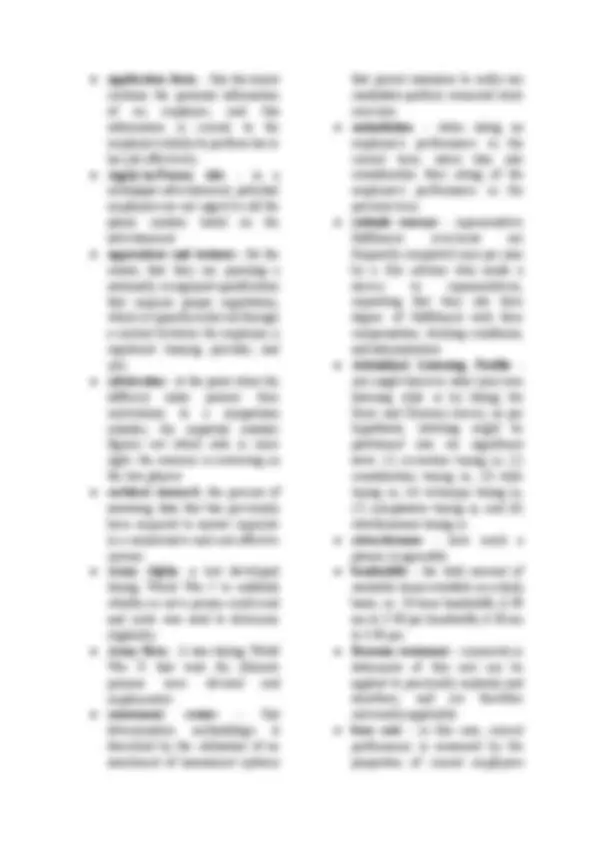
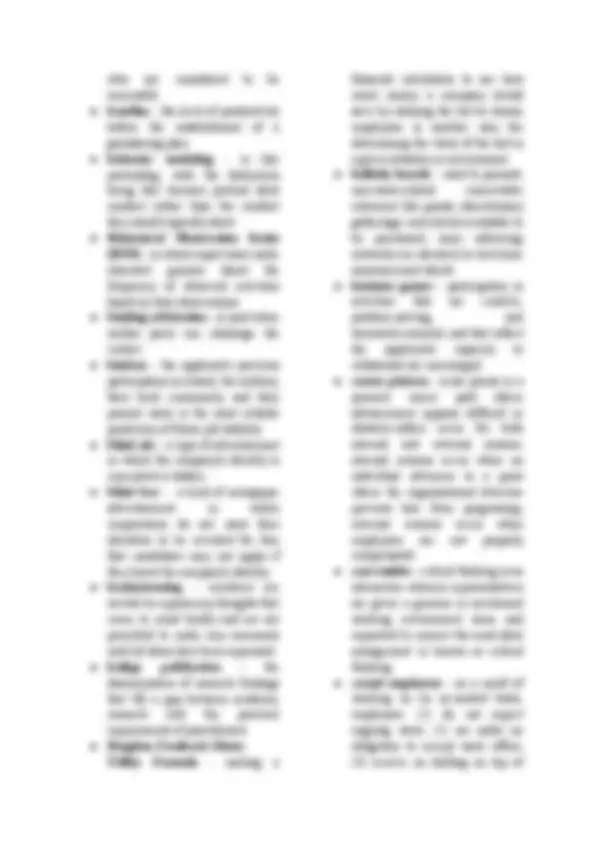
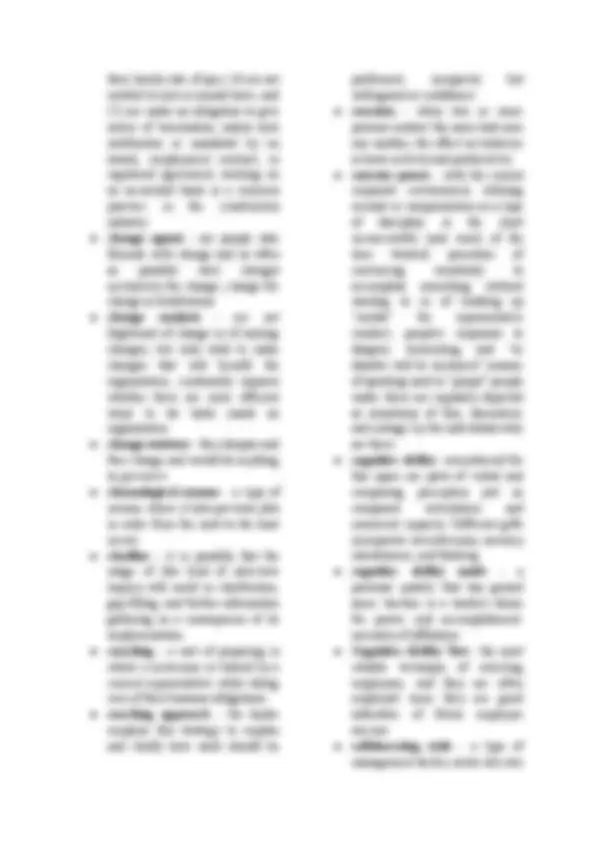
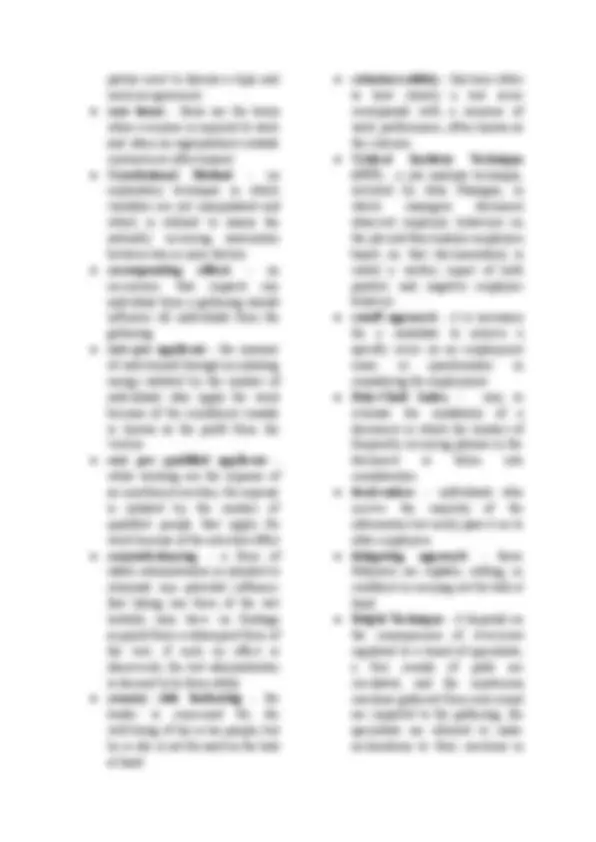
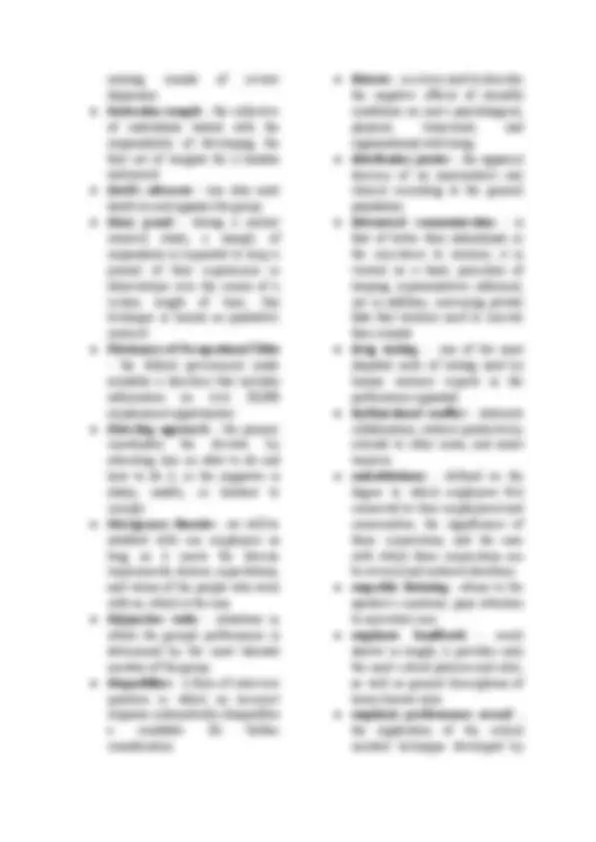
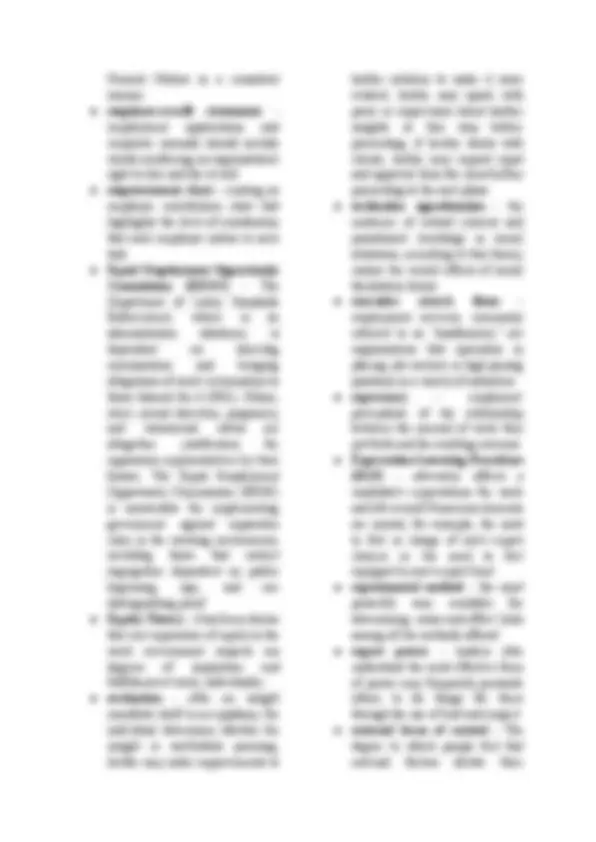
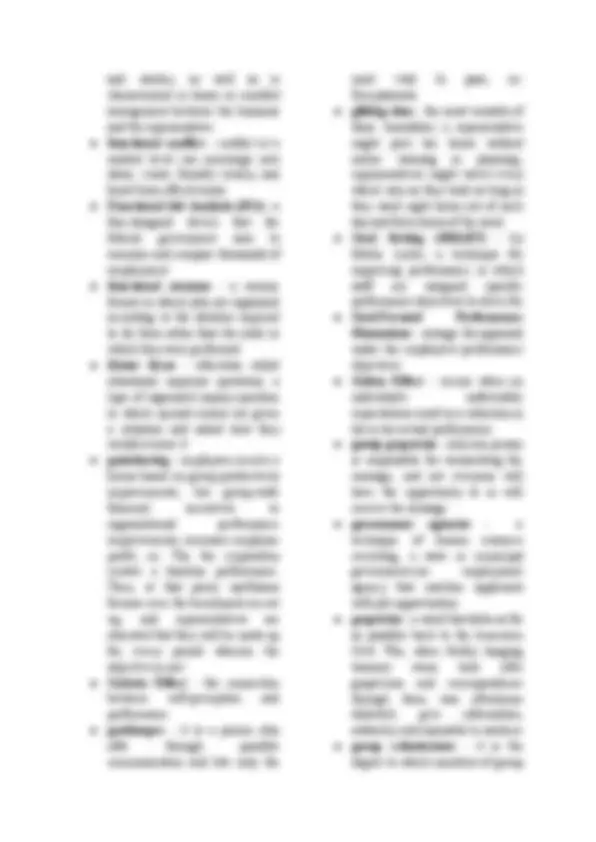
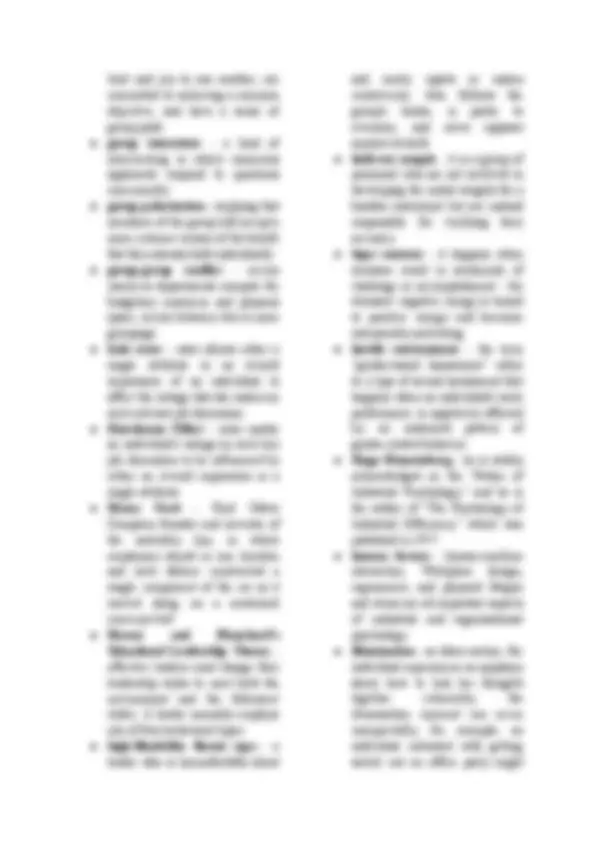
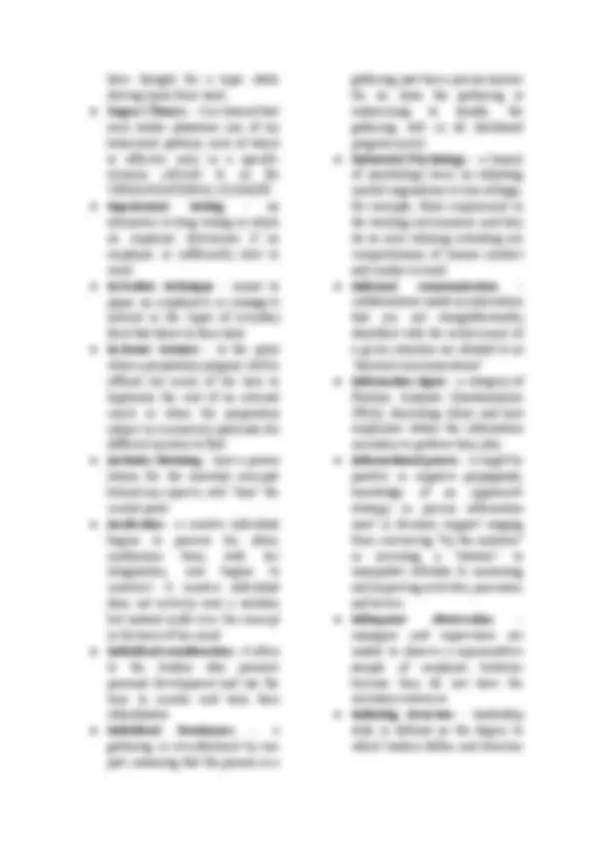
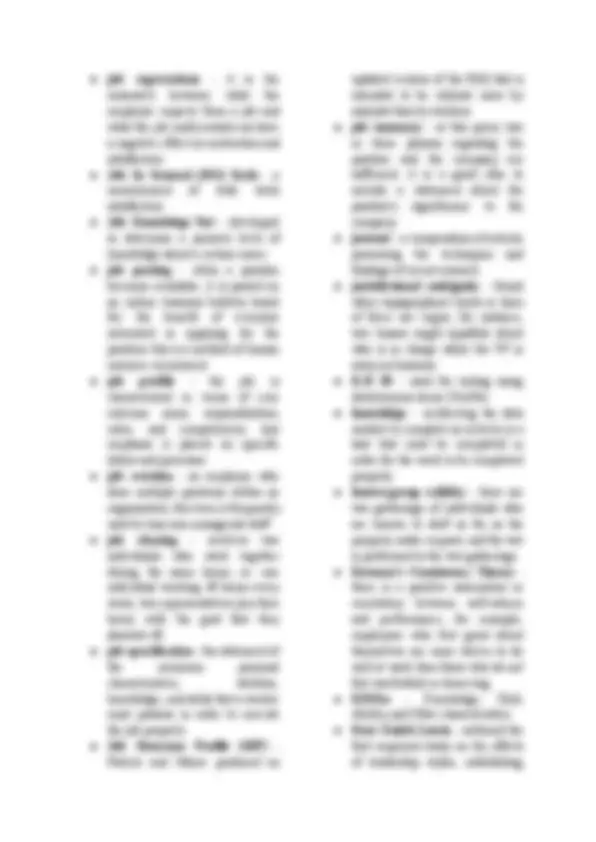
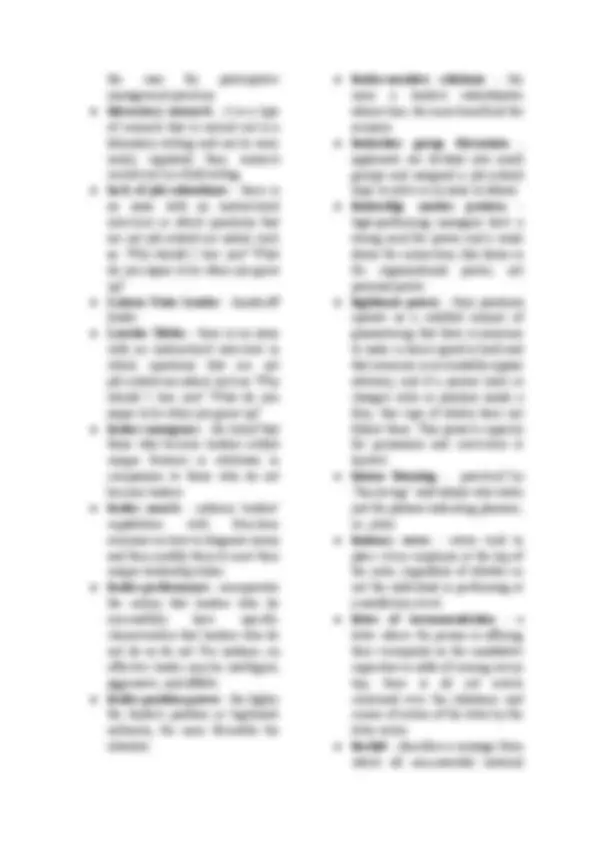
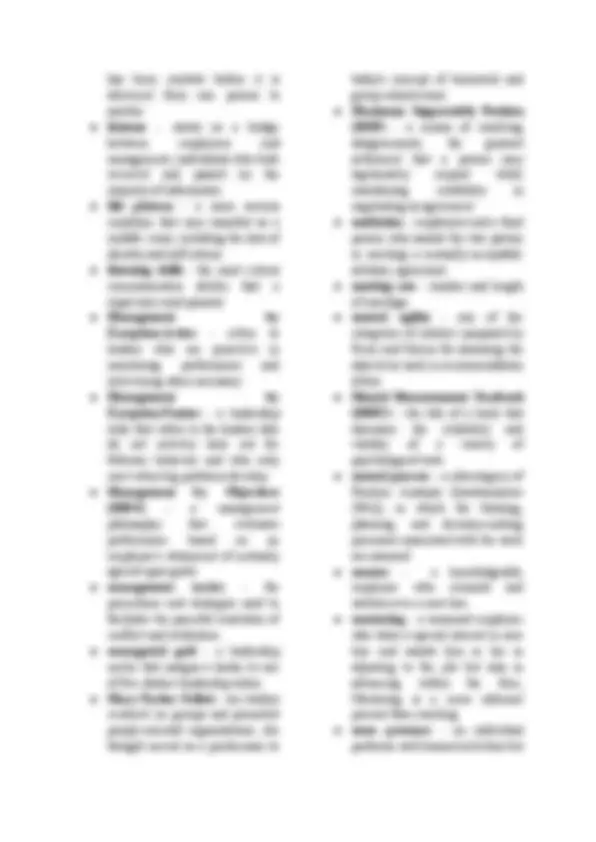
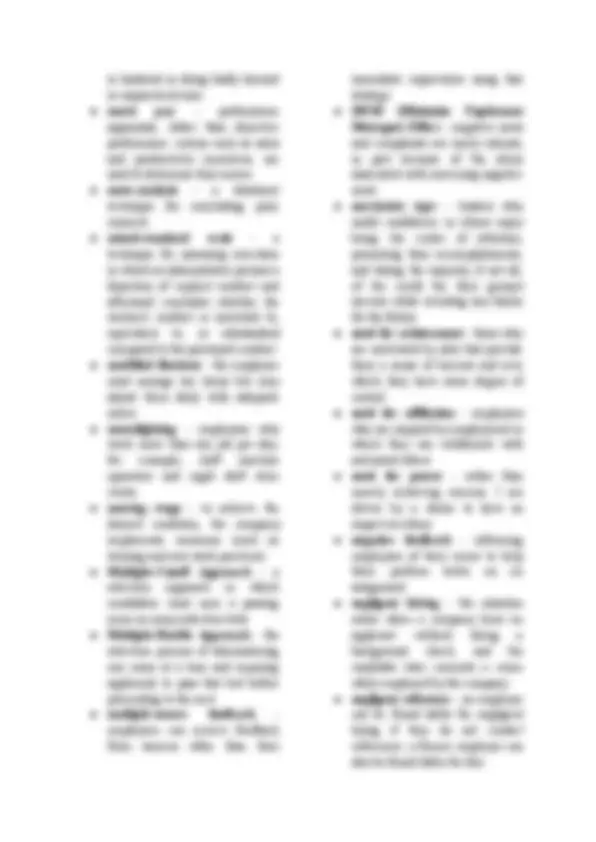
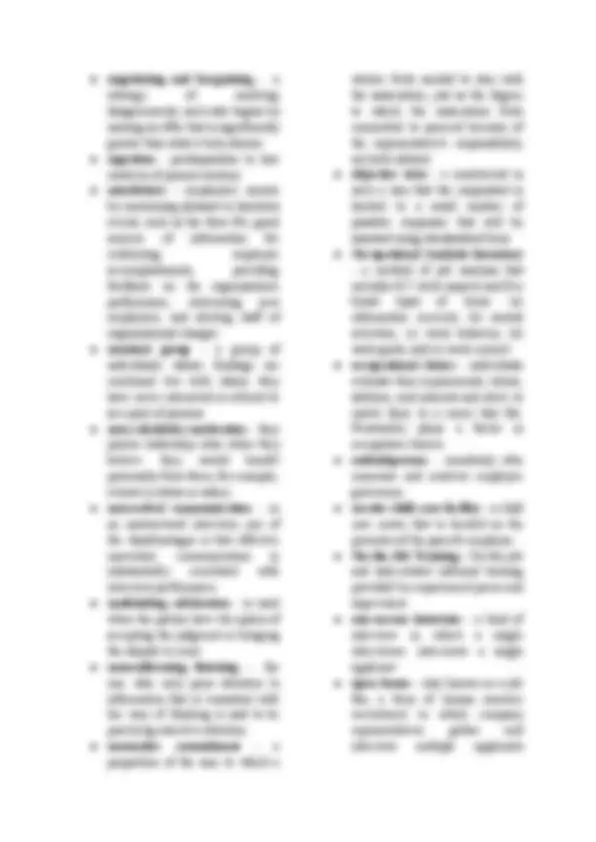
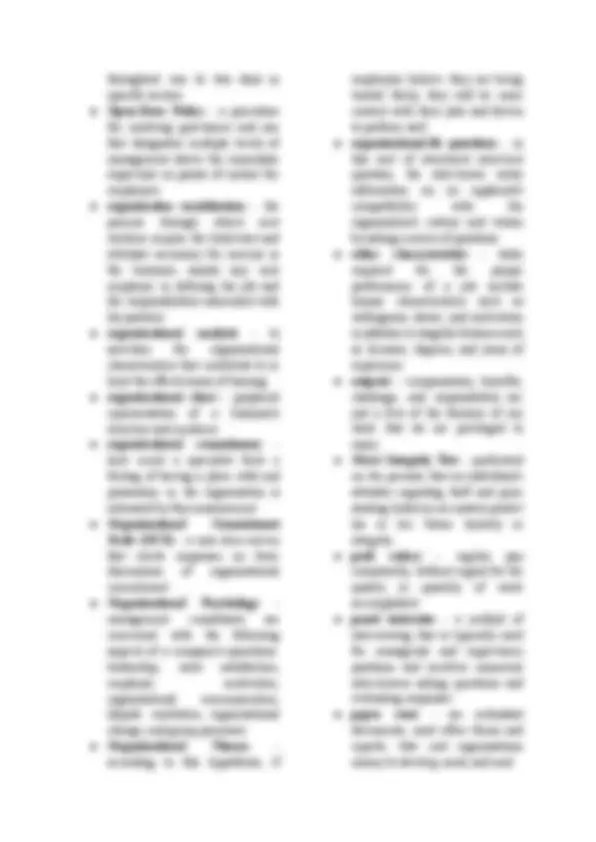
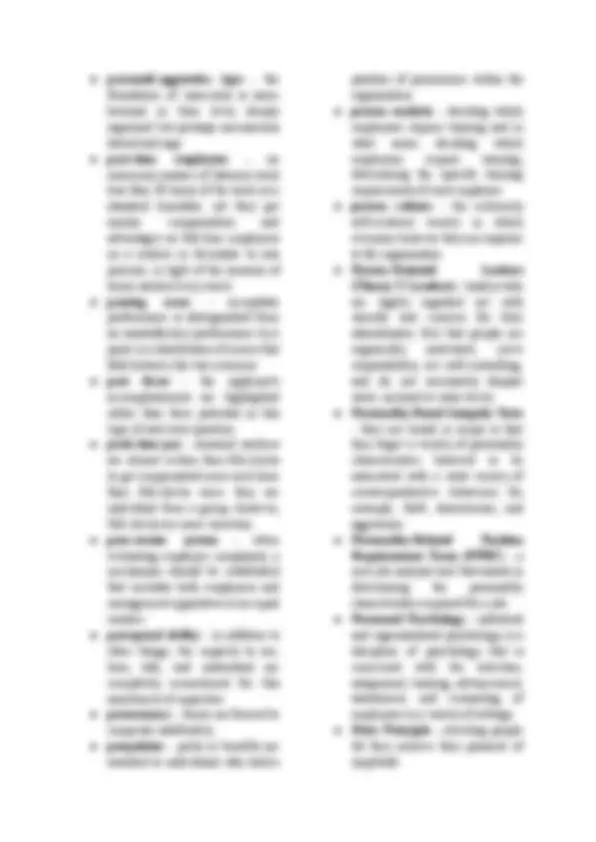
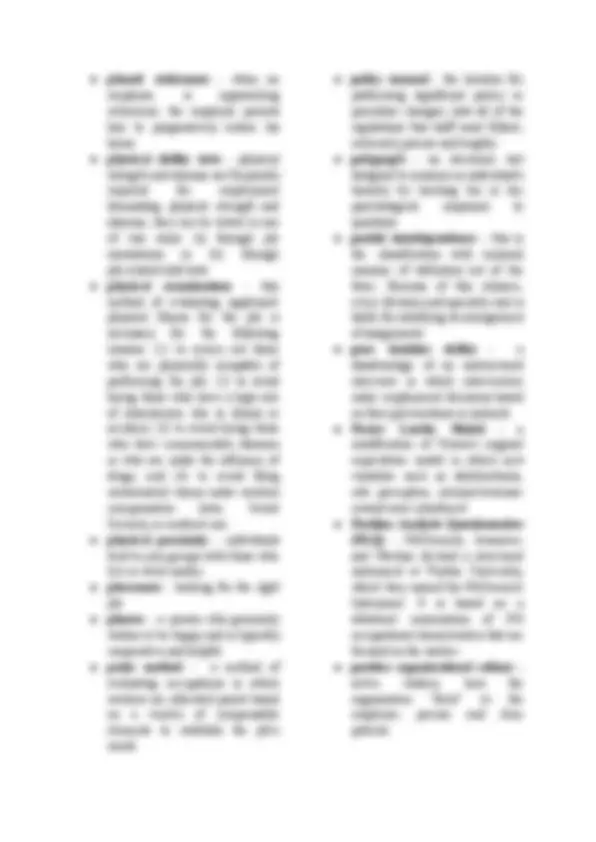
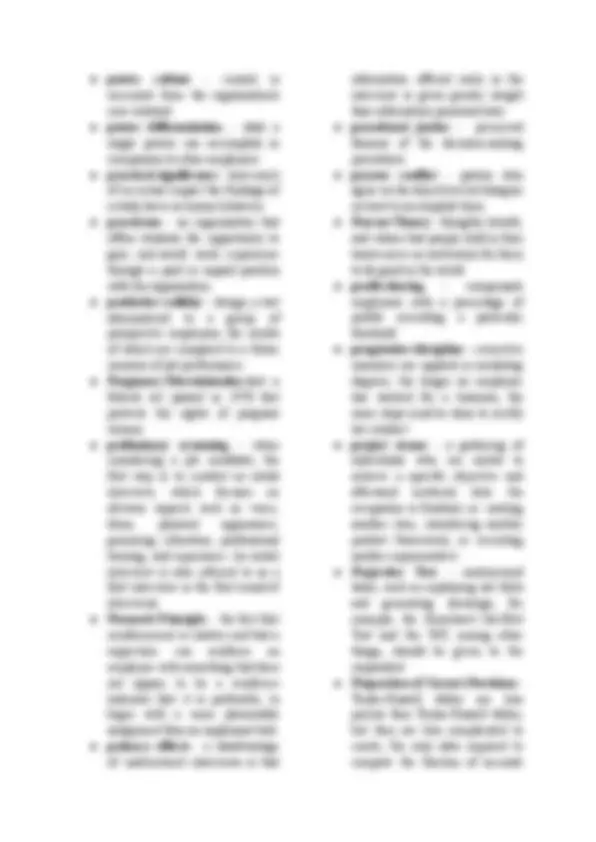
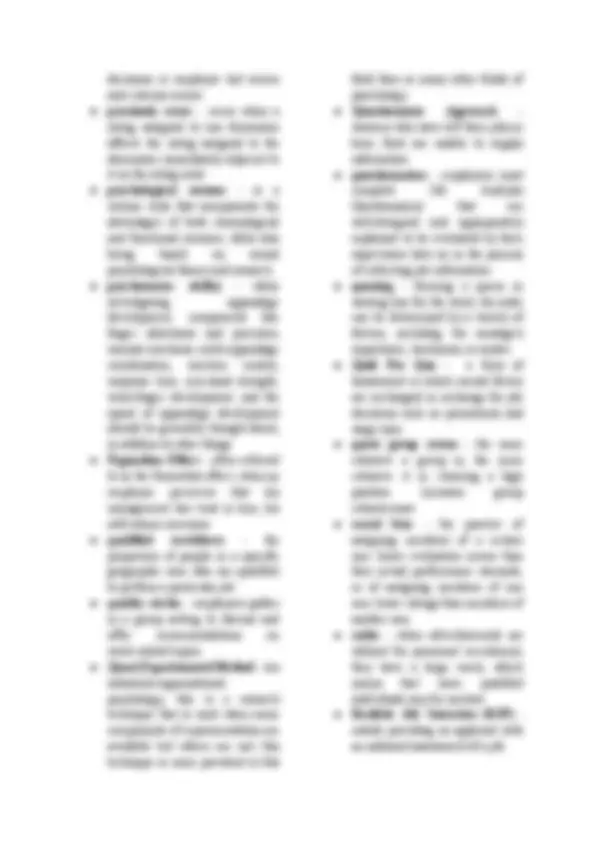
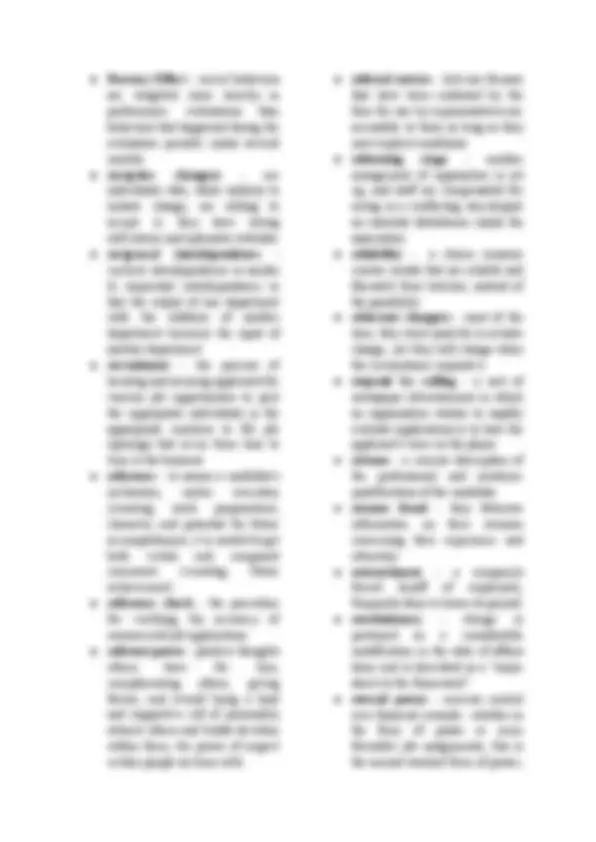
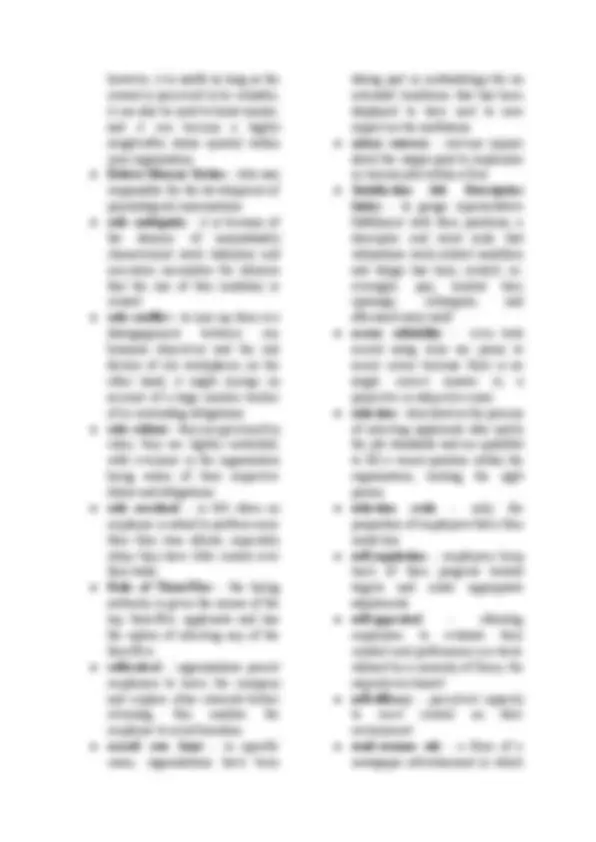
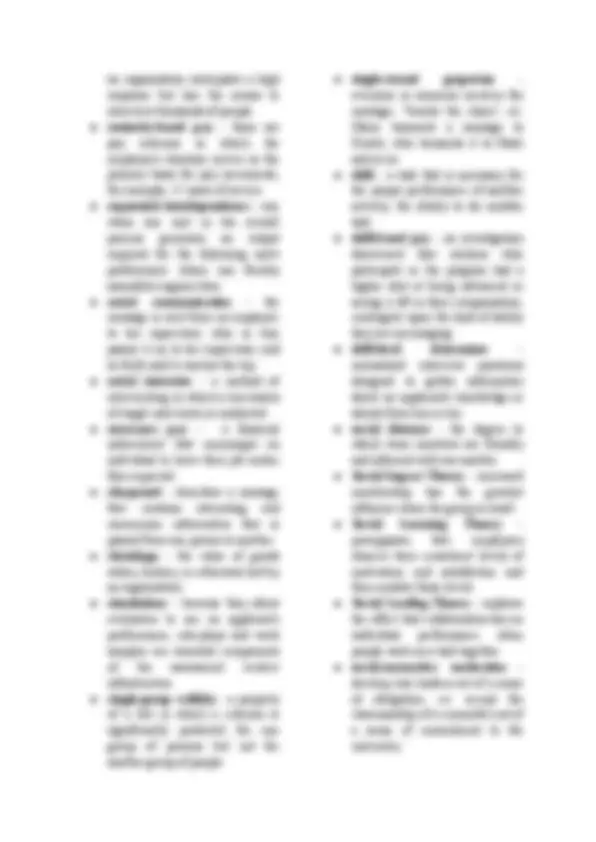
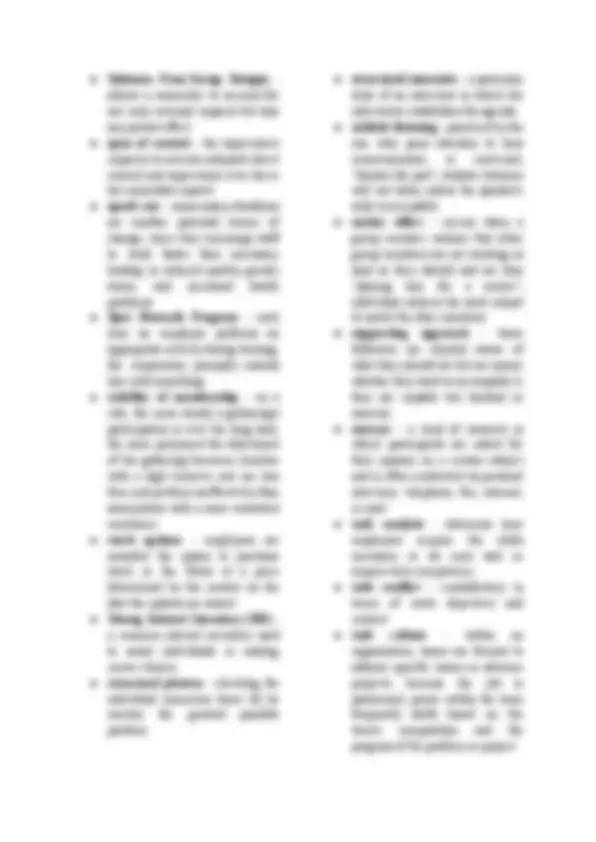
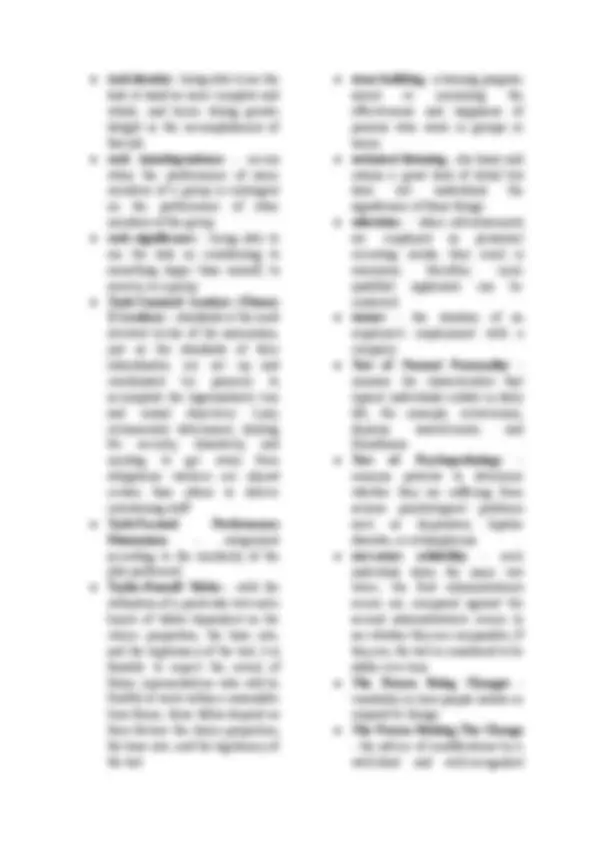
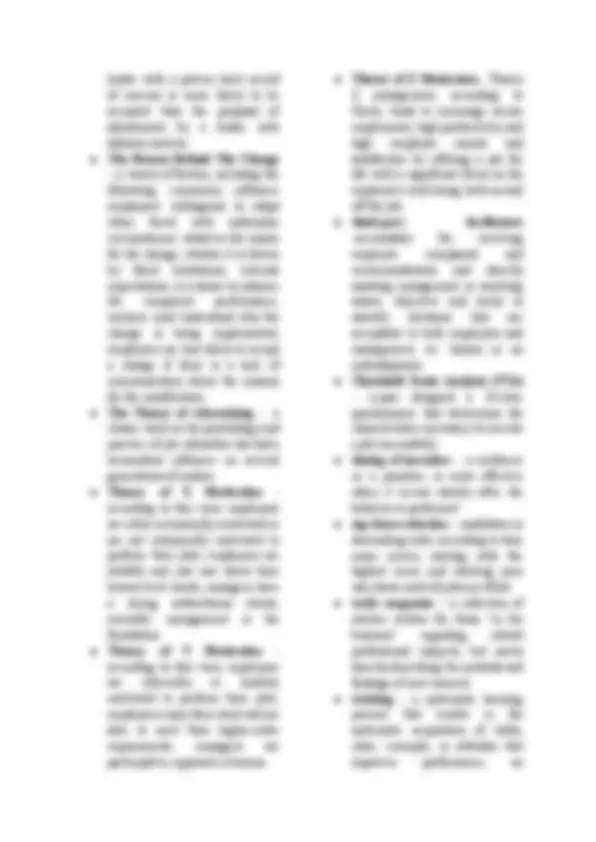
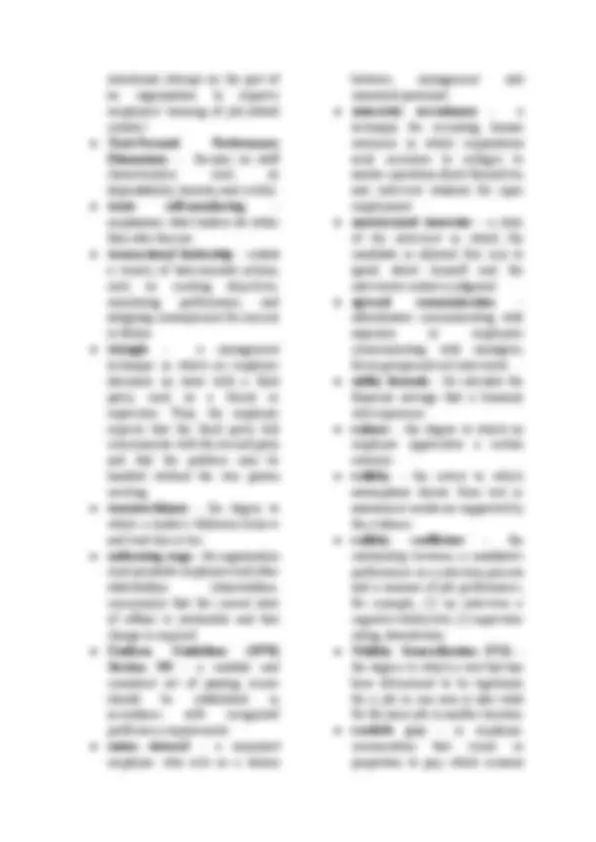
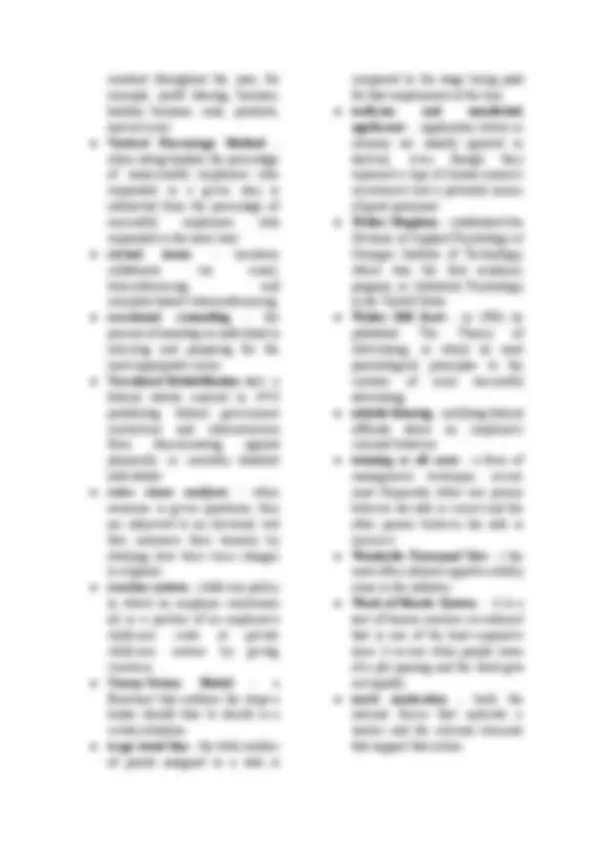



Study with the several resources on Docsity

Earn points by helping other students or get them with a premium plan


Prepare for your exams
Study with the several resources on Docsity

Earn points to download
Earn points by helping other students or get them with a premium plan
Community
Ask the community for help and clear up your study doubts
Discover the best universities in your country according to Docsity users
Free resources
Download our free guides on studying techniques, anxiety management strategies, and thesis advice from Docsity tutors
A dictionary of terms related to industrial-organizational psychology. It includes definitions of terms such as ability, ability test, acceptable compromise, and more. The document covers topics such as recruitment, employee motivation, job performance, and employee selection. It is a useful resource for students and professionals in the field of industrial-organizational psychology.
Typology: Transcriptions
1 / 36

This page cannot be seen from the preview
Don't miss anything!





























● ability - an errand that is vital for the legitimate exhibition of a task; an essential capacity to do a wide scope of assorted positions, the obtaining of information, or the improvement of a specific ability ● Ability Test - - a sort of test that measures an applicant’s ability to learn or perform a job-related skill to the greatest extent possible ● absolute amount - the actual monetary compensation or salary received for a specific task ● acceptable compromise - a form of accommodation; one that fits within both parties' settlement range; between the LAR and the MSP ● accommodating style - a form of management technique in which an individual is so bent on resolving a disagreement that he gives in and risks self-injury; Although organizations share the same goals, interactions are thought unimportant in achieving those goals. ● ads with emblem - a sort of advertisement in which the maximum number of candidates responds to the advertisement ● ads with salary range and company phone number - a sort of advertisement that is designed to attract applicants of the highest caliber ● adverse impact - members of one race, gender, or national origin suffer unfavorable effects more frequently than members of another race, gender, or national origin as a result of a particular employment choice, which is made without their knowledge or consent. ● advertising media - method of human resource recruitment that is popular and effective in soliciting applications through the media, including newspapers, magazines, radio, and television. ● affective commitment - employee's want to remain with the company; employee's concern for the organization and willingness to put out the effort on its behalf; employee's desire to continue with the company ● affective identity motivation - those who become leaders out of a desire to be in charge and lead others typically have the most leadership experience and have a high leadership potential. ● affective-cognitive consistency - consistently strong beliefs regarding their degree of job happiness ● affirmative action - it is viewed as a type of provocation or harassment and is one of the most misjudged lawful ideas in the field of business law. ● Age Discrimination in Employment Act (ADEA) - adults above the age of 40 are barred from being treated in any way, shape, or form under federal law in any way. ● alternate-forms reliability - there are two separate copies of the same test created, and their results are compared to see if they are similar in terms of difficulty and length. ● Alternative Dispute Resolution Methods (ADR Methods) - decisions that do not necessitate the use of legal proceedings
who are considered to be successful. ● baseline - the level of productivity before the establishment of a gainsharing plan ● behavior modeling - is like pretending, with the distinction being that learners pretend ideal conduct rather than the conduct they would typically show ● Behavioral Observation Scales (BOS) - in which supervisors make educated guesses about the frequency of observed activities based on their observations ● binding arbitration - is used when neither party can challenge the verdict ● biodata - the applicant's previous participation in school, the military, their local community, and their present work is the most reliable prediction of future job stability ● blind ads - a type of advertisement in which the company's identity is concealed or hidden ● blind box - a kind of newspaper advertisement in which corporations do not want their identities to be revealed for fear that candidates may not apply if they know the company's identity ● brainstorming - members are invited to express any thoughts that come to mind loudly and are not permitted to make any comments until all ideas have been expressed ● bridge publication - the dissemination of research findings that fill a gap between academic research and the practical requirements of practitioners ● Brogden-Cronbach-Gleser Utility Formula - making a financial calculation to see how much money a company would save by utilizing the test to choose employees is another way for determining the value of the test in a given situation or environment ● bulletin boards - used to promote non-work-related conceivable outcomes like grants, discretionary gatherings, and articles available to be purchased; inner informing networks are identical to electronic announcement sheets ● business games - participation in activities that are creative, problem-solving, and teamwork-oriented, and that reflect the applicant's capacity to collaborate are encouraged ● career plateau - acute points in a person's career path where advancement appears difficult or obstacle-ridden occur for both internal and external reasons; internal reasons occur when an individual advances to a point where the organizational structure prevents him from progressing; external reasons occur when employees are not properly compensated ● case studies - critical thinking is an interaction wherein representatives are given a genuine or envisioned working environment issue and requested to concoct the most ideal arrangement is known as critical thinking ● casual employees - as a result of working on an as-needed basis, employees: (1) do not expect ongoing work; (2) are under no obligation to accept work offers; (3) receive no loading on top of
their hourly rate of pay; (4) are not entitled to sick or annual leave; and (5) are under no obligation to give notice of termination, unless such notification is mandated by an award, employment contract, or registered agreement; working on an as-needed basis is a common practice in the construction industry ● change agents - are people who flourish with change and as often as possible start changes exclusively for change; change for change is troublesome ● change analysts - are not frightened of change or of making changes, but only wish to make changes that will benefit the organization; continually inquires whether there are more efficient ways to do tasks inside an organization ● change resistors - they despise and fear change and would do anything to prevent it ● chronological resume - a type of resume where it lists previous jobs in order from the most to the least recent ● clarifier - it is possible that the usage of this kind of interview inquiry will result in clarification, gap filling, and further information gathering as a consequence of its implementation ● coaching - a sort of preparing in which a newcomer is tutored by a current representative while taking care of their business obligations ● coaching approach - the leader employs this strategy to explain and clarify how work should be performed; incapacity but willingness or confidence ● coaction - when two or more persons conduct the same task near one another, the effect on behavior is lower activity and productivity ● coercive power - with the current corporate environment, utilizing excusal or nonpromotion as a type of discipline is the most un-successful (and much of the time twisted) procedure of convincing somebody to accomplish something without wanting to or of building up "results" for representative conduct; people's responses to dangers, tormenting, and "or disaster will be imminent" manner of speaking used to "propel" people under them are regularly depicted as sensations of fear, discontent, and outrage by the individuals who see them ● cognitive ability -remembered for this space are parts of verbal and composing perception just as composed articulation and numerical capacity. Different gifts incorporate inventiveness, memory maintenance, and thinking ● cognitive ability needs - a personal quality that has gained some traction is a leader's desire for power and accomplishment. necessity of affiliation ● Cognitive Ability Test - the most reliable technique of selecting employees, and they are often employed since they are good indicators of future employee success ● collaborating style - a type of management tactics; seeks win-win
you will ask them to choose the argument that most successfully supports or explains each of those statements ● conflict - mental and social reaction to the conviction that someone else is obstructing your advancement toward an objective or denying you of your entitlement to act with a particular goal in mind. penetrating a relationship's assumptions ● construct validity - it is dependability, which is the most hypothetical of the three rules of legitimacy, characterized as the degree to which a test genuinely gauges the thought that it is intended to survey, that is the main thought ● consumer panel - this is a list of respondents in a specific geographic area who have accepted to participate in a questionnaire about products, services, marketing, or other promotional initiatives, and who have agreed to participate in the questionnaire ● Consumer Psychology - research into the factors behind people's purchases of particular goods and services ● contamination - in this scenario, the employee's criterion score is influenced by events that are beyond their control ● content plateau - when one has mastered the job and tasks until he has become bored with what he is doing ● Content Theory - individuals are motivated by their own set of requirements that are specific to them. ● content validity - the extent to which test items serve as a representative sample of the issue for which they were developed ● contextual performance - employees make efforts to get along with their coworkers, contribute to the success of the company, and carry out activities that are required but may not necessarily fit within the scope of the employee's job description in order to be successful ● contingency of consequences - should at the very least demonstrate that the employee comprehends the conduct that resulted in punishment or reward ● contingent reward - refers to leaders who reward followers for engaging in the desired activity ● continuance commitment - the level to which a worker accepts she is committed to remaining with the organization because of the time, cost, and exertion she has effectively contributed or the trouble she would confront tracking down another work ● contrast effects - the term "defect in the interview" refers to the situation in which one applicant's performance has an adverse effect on the perception of another applicant's performance during an unstructured interview ● contrast error - people's perceptions of their performance can be influenced by the performance of other people who have been evaluated in the same or a similar fashion as they are ● cooperative problem solving - way of settling disagreement; two
parties meet to discuss a topic and reach an agreement ● core hours - these are the hours when everyone is required to work and when an organization's outside contracts are often busiest ● Correlational Method - an exploratory technique in which variables are not manipulated and which is utilized to assess the naturally occurring association between two or more factors ● corresponding effects - an occurrence that impacts one individual from a gathering should influence all individuals from the gathering ● cost per applicant - the measure of cash burned through on enlisting energy isolated by the number of individuals who apply for work because of the enrollment crusade is known as the profit from the venture ● cost per qualified applicant - while working out the expense of an enrollment exertion, the expense is isolated by the number of qualified people that apply for work because of the selection effort ● counterbalancing - a form of stable administration is intended to eliminate any potential influence that taking one form of the test initially may have on findings acquired from a subsequent form of the test; if such an effect is discovered, the test administration is deemed to be form stable ● country club leadership - the leader is concerned for the well-being of his or her people, but he or she is not focused on the task at hand ● criterion validity - this term refers to how closely a test score corresponds with a measure of work performance, often known as the criterion ● Critical Incident Technique (CIT) - a job analysis technique, invented by John Flanagan, in which managers document observed employee behaviors on the job and then analyze employees based on that documentation is called a written report of both positive and negative employee behavior ● cutoff approach - it is necessary for a candidate to achieve a specific score on an employment exam or questionnaire in considering for employment ● Dale-Chall Index - way to evaluate the readability of a document in which the number of frequently occurring phrases in the document is taken into consideration ● dead-enders - individuals who receive the majority of the information but rarely pass it on to other employees ● delegating approach - these followers are capable, willing, or confident in carrying out the task at hand ● Delphi Technique - it depends on the consequences of overviews regulated to a board of specialists; a few rounds of polls are circulated, and the mysterious reactions gathered from each round are imparted to the gathering; the specialists are allowed to make acclimations to their reactions in
General Motors in a consistent manner ● employee-at-will statements - employment applications and corporate manuals should include words reinforcing an organization's right to hire and fire at will ● empowerment chart - creating an employee contribution chart that highlights the level of contribution that each employee makes to each task ● Equal Employment Opportunity Commission (EEOC) - The Department of Labor Standards Enforcement, which is an administration substance, is dependent on directing examinations and bringing allegations of work victimization to those blamed for it (DOL). Ethnic, strict, sexual direction, pregnancy, and transsexual status are altogether justification for oppression representatives by their bosses. The Equal Employment Opportunity Commission (EEOC) is answerable for implementing government against separation rules in the working environment, including those that restrict segregation dependent on public beginning, age, and sex distinguishing proof ● Equity Theory - it has been shown that our impression of equity in the work environment impacts our degrees of inspiration and fulfillment at work, individually ● evaluation - after an insight manifests itself in an epiphany, the individual determines whether the insight is worthwhile pursuing; he/she may make improvements to his/her solution to make it more evident; he/she may speak with peers or supervisors about his/her insights at this step before proceeding; if he/she works with clients, he/she may request input and approval from the client before proceeding to the next phase ● evaluation apprehension - the existence of reward (cheers) and punishment (scolding) in social situations, according to this theory, causes the varied effects of social facilitation (boos) ● executive search firms - employment services, commonly referred to as "headhunters," are organizations that specialize in placing job seekers in high-paying positions in a variety of industries ● expectancy - employees' perceptions of the relationship between the amount of work they put forth and the resulting outcome ● Expectation-Lowering Procedure (ELP) - adversely affects a candidate's expectations for work and life overall Numerous elements are mental, for example, the need to feel in charge of one's expert choices or the need to feel equipped in one's expert limit ● experimental method - the most powerful way available for determining cause-and-effect links among all the methods offered ● expert power - leaders who understand the most effective form of power may frequently persuade others to do things for them through the use of trust and respect ● external locus of control - The degree to which people feel that external factors dictate their
success and failure; ex: luck, other people ● external pay equity - in today's competitive labor market, evaluating the worth of a job concerning the external market is critical for both attracting and maintaining qualified individuals ● external source - hiring from outside sources is a management alternative when no one within the next rank of employees can successfully perform the job. For example, if no one within the next rank of employees can successfully perform the task, the hiring from outside sources is an option ● external trainers - an association might take on a preparation model called for when its coaches need topic aptitude or when the cost of conveying a preparation program inside surpasses the expense of contracting with an outer mentor ● extrinsic motivation - occupational motivation that is generated by things other than one's own personal circumstances such as money, coworkers, and future career chances ● extrinsically motivated - dread the activities yet are encouraged to perform well in order to earn a reward or avoid unfavorable repercussions ● face validity - to what extent a test appears to be relevant to a given stance is determined ● faces scale - rates place a tick next to the facial expression that most closely resembles how they feel about their jobs ● fear of ramification - a person who offers references may be held accountable for defamation of character if the information provided is false ● feedback - delivery of clear and concise feedback to employees regarding their accomplishment of a task or sequence of tasks ● Field Research - when compared to laboratory research, field research involves conducting experiments in a natural setting where participants can interact with their surroundings ● Fifth Amendment - it is expressed in the United States Constitution that the central government may not prevent an individual the equivalent security from getting the laws under any conditions ● file approach - obtain information from an employee's personnel file about the employee's previous job, education, interests, and demographics by conducting an investigation ● fixed-term employees - employed full-time or part-time, are eligible for the same leave benefits as permanent employees, but they are not paid a pro-rata share of the benefits based on the length of time they have been with the firm ● Fleishman Job Analysis Survey (F-JAS) - a type of job analysis in which jobs are assessed according to the competencies required to do them ● Flesch index - a procedure for deciding a message's clarity level that includes inspecting the normal sentence length and the number of syllables per 100 words ● flexible hours - those that remain inside the employee's scope and
and worker, as well as is characterized in honor or enrolled arrangement between the business and the representative ● functional conflict - conflict at a modest level can encourage new ideas, create friendly rivalry, and boost team effectiveness ● Functional Job Analysis (JFA) - a fine-designed device that the federal government uses to examine and compare thousands of employment ● functional resumes - a resume format in which jobs are organized according to the abilities required to do them rather than the order in which they were performed ● future focus - otherwise called situational inquiries questions, a type of organized inquiry question in which up-and-comers are given a situation and asked how they would oversee it ● gainsharing - employees receive a bonus based on group productivity improvements; ties group-wide financial incentives to organizational performance improvements; increases employee profit; ex: The the corporation creates a baseline performance. Then, at that point, usefulness focuses over the benchmark are set up, and representatives are educated that they will be made up for every period wherein the objective is met ● Galatea Effect - the connection between self-perception and performance ● gatekeeper - it is a person who sifts through possible communication and lets only the most vital to pass; ex: Receptionists ● gliding time - the most versatile of these timetables; a representative might pick her hours without earlier warning or planning; representatives might travel every which way as they wish as long as they work eight hours out of each day and forty hours of the week ● Goal Setting (SMART) - by Edwin Locke; a technique for improving performance in which staff are assigned specific performance objectives to strive for ● Goal-Focused Performance Dimensions - arrange the appraisal under the employee's performance objectives ● Golem Effect - occurs when an individual's unfavorable expectations result in a reduction in his or her actual performance ● gossip grapevine - only one person is responsible for transmitting the message, and not everyone will have the opportunity to or will receive the message ● government agencies - a technique of human resource recruiting, a state or municipal government-run employment agency that matches applicants with job opportunities ● grapevine - a word that dates as far as possible back to the American Civil War, when feebly hanging transmit wires took after grapevines and correspondence through them was oftentimes distorted; give information, authority, and enjoyable to workers ● group cohesiveness - it is the degree to which members of group
trust and joy to one another; are committed to achieving a common objective, and have a sense of group pride ● group interviews - a kind of interviewing in which numerous applicants respond to questions concurrently ● group polarization - implying that members of the group will accept a more extreme version of the beliefs that they already hold individually ● group-group conflict - occurs yearly as departments compete for budgetary resources and physical space; occurs between two or more groupings ● halo error - rates allows either a single attribute or an overall impression of an individual to affect the ratings that she makes on each relevant job dimension ● Hawthorne Effect - rates enable an individual's ratings on each key job dimension to be influenced by either an overall impression or a single attribute ● Henry Ford - Ford Motor Company founder and inventor of the assembly line, in which employees stayed in one location and each laborer constructed a single component of the car as it moved along on a motorized conveyor belt ● Hersey and Blanchard’s Situational Leadership Theory - effective leaders must change their leadership styles to meet both the environment and the followers' styles. A leader normally employs one of four behavioral types ● high-likeability floater type - a leader who is uncomfortable about and rarely upsets or makes controversy; who follows the group's leader, is polite to everyone, and never opposes anyone's beliefs ● hold-out sample - it is a group of personnel who are not involved in developing the initial weights for a biodata instrument but are instead responsible for verifying their accuracy ● hope eustress - it happens when stressors result in sentiments of challenge or accomplishment - the stressors' negative energy is turned to positive energy and becomes intrinsically motivating ● hostile environment - the term "gender-based harassment" refers to a type of sexual harassment that happens when an individual's work performance is negatively affected by an undesired pattern of gender-related behavior ● Hugo Munsterberg - he is widely acknowledged as the "Father of Industrial Psychology," and he is the author of "The Psychology of Industrial Efficiency," which was published in 1957 ● human factors - human-machine interaction, Workplace design, ergonomics, and physical fatigue and stress are all important aspects of industrial and organizational psychology ● illumination - as ideas mature, the individual experiences an epiphany about how to link her thoughts together coherently; the illumination moment can occur unexpectedly; for example, an individual entrusted with getting sorted out an office party might
their own and subordinates' responsibilities ● input/output ratio - dividing the output value by the input value for other workers and past job experiences and comparing them to their own ● inputs - those components of our personalities that we invest in our employment; for example, our time, effort, education, and experience ● Institutional Review Board - where a committee has been established to ensure that research subjects are treated with integrity ● instrumentality - the extent to which the outcome of a worker’s performance if noticed results in a particular consequence ● integrity tests - tell an employer the probability that an applicant would steal money or merchandise; used mostly in the retail area ● intellectual stimulation - refers to leaders who encourage change and open thinking, challenge the status quo, and appreciate diversity ● interactional justice - perceived fairness of the interpersonal treatment employees receive ● interdependence - one member does greatly influences what another member does ● interest inventories - designed to tap vocational interests; useful in vocational counseling; help people find the careers for which they are best suited ● internal locus of control - The extent to which people believe that they are responsible for and in control of their success or failure in life ● internal pay equity - involves comparing jobs within an organization to ensure that the people in jobs worth the most money are paid accordingly ● internal source - one of the two major sources of candidates to fill vacant positions, these are qualified candidates from the company and within the ranks of its present employees, ex: present employees, former employees, previous employees ● internship - a situation in which a student works for an organization, either for pay or as a volunteer, to receive practical work experience ● interrater reliability - two interviewers will give an applicant similar ratings ● interviewee appearance - a problem with an unstructured interview where attractiveness bias occurred for men and women ● interviewer-applicants similarities - a problem with an unstructured interview where applicants will receive a higher score if she or he is similar to the interviewer in terms of personality, attitude, or race ● intra organizational communication - communication within an organization ● intranets - to replace bulletin boards, newsletters,, and company manuals; organization-wide versions of the internet ● intrarole - demands are within a single domain of life, such as on the job. ● intrinsically motivated - they strive for excellence because they either like executing the duties
themselves or the challenge of completing them ● investigate interview - an interview conducted prior to disciplinary action being taken; the interview focuses on how the offense broke performance criteria, and the employee is given an opportunity to defend himself or herself ● isolates - less than half of the information obtained by employees ● isolation - another factor that contributes to a group's cohesiveness is physical isolation ● James Mckeen Catell - he founded Psychological Corporation to advance psychology and demonstrate its utility to industry ● Job Adaptability Inventory (JAI)
the case for participative management practices ● laboratory research - it is a type of research that is carried out in a laboratory setting and can be more easily regulated than research carried out in a field setting ● lack of job-relatedness - there is an issue with an unstructured interview in which questions that are not job-related are asked, such as: Why should I hire you? What do you aspire to be when you grow up? ● Laissez Faire Leader - hands-off leader ● Lawshe Tables - there is an issue with an unstructured interview in which questions that are not job-related are asked, such as: Why should I hire you? What do you aspire to be when you grow up? ● leader emergence - the belief that those who become leaders exhibit unique features or attributes in comparison to those who do not become leaders ● leader match - enhance leaders' capabilities with four-hour seminars on how to diagnose issues and then modify them to meet their unique leadership styles ● leader performance - incorporates the notion that leaders who do successfully have specific characteristics that leaders who do not do so do not. For instance, an effective leader may be intelligent, aggressive, and affable ● leader position power - the higher the leader's position or legitimate authority, the more favorable the situation ● leader-member relations - the more a leader's subordinates admire him, the more beneficial the scenario ● leaderless group discussion - applicants are divided into small groups and assigned a job-related topic to solve or an issue to debate ● leadership motive pattern - high-performing managers have a strong need for power and a weak desire for connection; this desire is for organizational power, not personal power ● legitimate power - their positions operate as a codified manner of guaranteeing that there is someone to make a choice (good or bad) and that someone is accountable appear arbitrary, and if a person loses or changes roles or position inside a firm, this type of ability does not follow them. This power's capacity for persuasion and conviction is limited ● leisure listening - practiced by "fun-loving" individuals who listen just for phrases indicating pleasure; ex: jokes ● leniency error - raters tend to place every employee at the top of the scale, regardless of whether or not the individual is performing at a satisfactory level ● letter of recommendation - a letter where the person is offering their viewpoints on the candidate's capacities or odds of coming out on top; there is all out article command over the substance and course of action of the letter by the letter writer ● leveled - describes a message from which all non-essential material
has been omitted before it is delivered from one person to another ● liaisons - works as a bridge between employees and management; individuals who both received and passed on the majority of information ● life plateau - a more serious condition that may manifest as a midlife crisis, including the loss of identity and self-esteem ● listening skills - the most critical communication ability that a supervisor must possess ● Management by Exception-Active - refers to leaders who are proactive in monitoring performance and intervening when necessary ● Management by Exception-Passive - a leadership style that refers to the leaders who do not actively look out for follower behavior and who only react when big problems develop ● Management by Objectives (MBO) - a management philosophy that evaluates performance based on an employee's attainment of mutually agreed-upon goals ● management tactics - the procedures and strategies used to facilitate the peaceful resolution of conflict and retribution ● managerial grid - a leadership metric that assigns a leader to one of five distinct leadership styles ● Mary Parker Follett - her studies centered on groups and promoted people-oriented organizations; she thought served as a predecessor to today's concept of teamwork and group cohesiveness ● Maximum Supportable Position (MSP) - a means of resolving disagreements; the greatest settlement that a person may legitimately request while maintaining credibility in negotiating an agreement ● mediation - employees and a third person who assists the two parties in reaching a mutually acceptable solution; agreement ● meeting cow - number and length of meetings ● mental agility - one of the categories of intellect proposed by Peres and Garcia for assessing the adjectives used in recommendation letters ● Mental Measurements Yearbook (MMY) - the title of a book that discusses the reliability and validity of a variety of psychological tests ● mental process - a subcategory of Position Analysis Questionnaires (PAQ), in which the thinking, planning, and decision-making processes associated with the work are assessed ● mentor - a knowledgeable employee who counsels and watches over a new hire ● mentoring - a seasoned employee who takes a special interest in new hire and assists him or her in adjusting to the job but also in advancing within the firm; Mentoring is a more informal process than coaching ● mere presence - an individual performs well-learned activities but